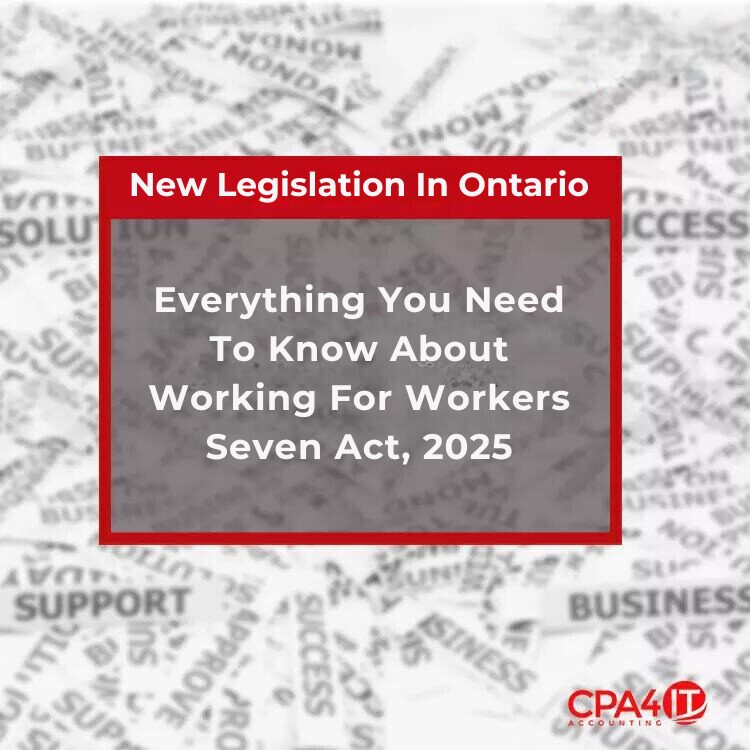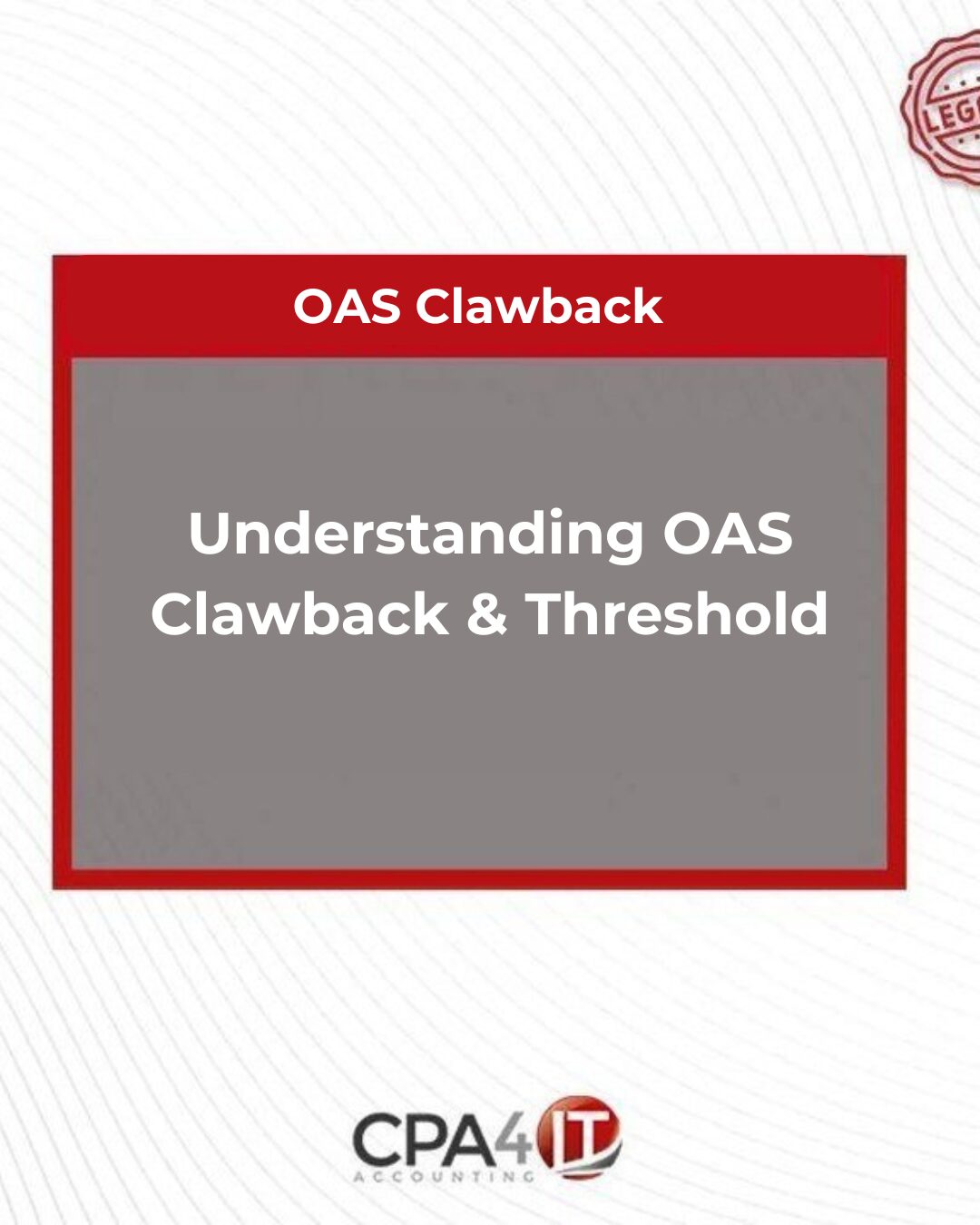On May 28, 2025, the Government of Ontario introduced the Working for Workers Seven Act, 2025, a landmark piece of legislation aimed at strengthening protections for workers, improving access to the job market, and modernizing services. As part of the province’s broader effort to support its workforce and address ongoing challenges, this act builds upon the foundational policies introduced in previous iterations of the “Working for Workers” legislation. The latest proposed changes reflect a continued commitment to supporting Ontario’s workers, job seekers, and newcomers while bolstering the province’s economy through smarter regulations and fairer labour practices.
Our Partnership With Acsess
CPA4IT is not just another accounting firm. It is the only accounting firm that holds membership with Acsess, which gives it unique access to the same tools, policy updates, and industry insights that top staffing agencies rely on. This membership allows CPA4IT to stay ahead of legal and regulatory changes affecting the independent contractor space.
Through this relationship, CPA4IT actively contributes to and learns from the same policy discussions and legal updates that Acsess shares with its member agencies. That insight empowers CPA4IT to offer more precise, relevant, and up-to-date advice to its contractor clients—especially when navigating grey areas like worker classification, PSB risk, and audit defense strategies.
Supporting Workers with Stronger Protections
At the heart of the Working for Workers Seven Act is a renewed focus on strengthening workplace protections. The act introduces a series of reforms that will bolster workers’ rights and ensure better compliance from employers. One of the notable changes is the government’s intention to enshrine the right to three paid sick days for workers under the Employment Standards Act, 2000. This move seeks to address the gap exposed during the COVID-19 pandemic and provide workers with the security they need to prioritize their health without sacrificing income.
Additionally, the act proposes improved measures to crack down on repeat violators of workplace laws, including tougher enforcement against businesses that continue to breach employment standards or workplace safety regulations. The province intends to make it easier to identify these repeat offenders and hold them accountable through more robust compliance tools.
Ontario also plans to support vulnerable workers—including youth—by strengthening employment protections and expanding coverage for those in training and work-integrated learning programs. These measures are designed to ensure that every worker, regardless of age or employment status, benefits from a consistent and fair set of rights on the job.
Enhancing Access to Jobs and Skills Recognition
Labour shortages and barriers to employment remain a key concern across Ontario, particularly in high-demand industries. The Working for Workers Seven Act takes a proactive approach to addressing these issues by improving access to job opportunities and ensuring fair treatment for newcomers and skilled professionals.
A core element of the act involves removing barriers for out-of-province workers and internationally trained professionals. By expanding pathways to recognize out-of-province credentials, the government aims to make it easier for skilled individuals to enter Ontario’s workforce. This initiative will help reduce red tape and eliminate unnecessary delays in the licensing process, especially in sectors such as skilled trades and health care where demand for talent is critical.
The legislation also introduces provisions to support interprovincial labour mobility by harmonizing qualification and experience recognition standards. These changes will allow workers from other Canadian provinces to more easily transition into jobs in Ontario, bringing their skills and training with them. This step is particularly important in facilitating a stronger national labour force and ensuring that Ontario remains competitive in attracting talent.
Modernizing Government Services and Oversight
The Working for Workers Seven Act also lays out a plan to improve the efficiency and responsiveness of Ontario’s employment-related services. The legislation includes several amendments aimed at making government services more effective, transparent, and accountable.
Key among these is the introduction of mandatory service reviews within the Ministry of Labour, Immigration, Training and Skills Development. These reviews will evaluate the effectiveness of programs and policies, allowing the government to make evidence-based improvements in how services are delivered. The act also mandates public reporting and consultation, giving Ontarians more visibility into how employment standards are enforced and how decisions are made.
Strengthened oversight is another major component of the act. The government intends to bolster its powers to collect data, investigate complaints, and enforce compliance across the board. These new powers will help regulators ensure that employers are meeting their obligations and that workers have access to fair treatment in the workplace.
Prioritizing Youth and Newcomer Protections
Youth and vulnerable workers often face unique challenges in the labour market, including higher rates of exploitation and limited access to legal protections. The Working for Workers Seven Act takes a strong stance in addressing these issues by explicitly extending coverage to young workers and those participating in training programs or co-operative education.
The act proposes legal changes that will clarify and strengthen rights for students, interns, and trainees, ensuring that they receive the same basic protections as other workers under Ontario law. This includes clearer rules about hours of work, wages, and safe working conditions.
To support enforcement and raise awareness, the government also plans to launch public education campaigns to inform young workers about their rights. These campaigns will help students and early-career workers better understand how to navigate the job market and protect themselves from unfair treatment or unsafe conditions.
Building on a Proven Legislative Legacy
The Working for Workers Seven Act is the latest installment in a series of legislative efforts introduced by the Ontario government since 2021. Previous acts in the Working for Workers series introduced reforms such as guaranteed paid sick leave, minimum wage increases, licensing requirements for temporary help agencies, and support for military reservists. With each new act, the government has progressively expanded worker protections, reduced regulatory burdens, and helped ensure a fairer, more inclusive labour market.
This seventh iteration continues that momentum, integrating feedback from industry leaders, labour organizations, and Ontarians themselves. The government has indicated that if passed, the measures introduced in the Working for Workers Seven Act will be implemented in phases to allow for a smooth transition and to give stakeholders time to adjust.
What This Means for Ontario
For Ontario’s workforce, this legislation signals a strong commitment to fairness, equity, and opportunity. By prioritizing paid sick leave, removing credential barriers, improving government services, and enhancing protections for youth and newcomers, the government is addressing some of the most pressing concerns facing workers today.
Employers also stand to benefit from clearer rules and improved systems that support fair competition and a more agile hiring environment. As Ontario continues to grow and diversify, the Working for Workers Seven Act promises to play a crucial role in shaping a labour market that is not only more inclusive but also more competitive and responsive to economic needs.
Looking Ahead
As the Working for Workers Seven Act makes its way through the legislative process, all eyes will be on how these ambitious proposals are implemented. If passed, this legislation could set a new standard for worker protections in Canada and establish Ontario as a leader in forward-thinking labour policy.
The road to a stronger, more equitable workplace is long, but the Working for Workers Seven Act, 2025 takes a bold step forward in ensuring that Ontario’s workforce is protected, supported, and positioned for success.





